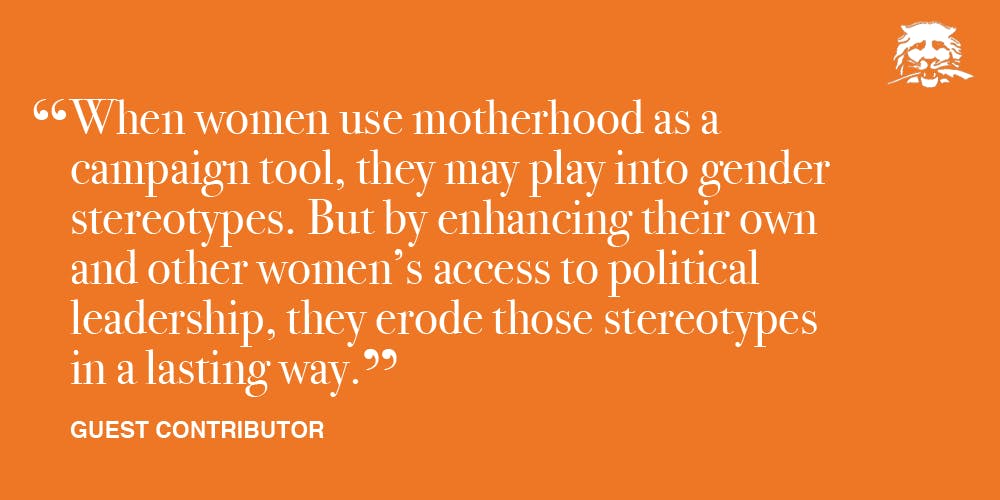During this midterm elections campaign season, many female candidates have used their status as mothers to defend their policy stances and appeal to voters. Some argue that this is detrimental to gender equality, because it plays into the idea that women must justify their leadership in some way. But while using motherhood as a campaign strategy may play into gender norms in the short term, it will be advantageous over the long term in the fight for gender equality.
Several female candidates are appealing to motherhood in their campaign pitches. Kelda Roys, a candidate for governor of Wisconsin, has expressed the motivation she felt to increase gun control at hearing her 3-year-old daughter recount an active-shooter drill at preschool. Betsy Dirksen Londrigan, an Illinois candidate for Congress, explained that she decided to run after the House passed legislation directed toward repealing Obamacare, a policy important to her because of her son’s serious illness.
The use of motherhood as a political tool is not new. But while Republican female candidates have largely adhered to conventional symbols of motherhood used in the past, Democratic candidates are now taking a more radical approach, staging campaign videos in which they breastfeed their infants on camera. According to political consultant Margie Omero, this is a response, in part, to the #MeToo movement’s demand that women should be able to express their realities without shame.
Though this new form of communicating motherhood may break from gender norms, political scientist Jill S. Greenlee argues that employing motherhood as a tactic at all is counterproductive for gender equality. “The reliance on motherhood to identify women’s political interests or to justify their concerns serves only to more deeply entrench the notion that women’s political claims must be legitimized in some fashion,” she writes.
What Greenlee does not recognize is that change takes time. Using motherhood as a campaign tactic will be advantageous overall in the fight for gender equality.
A study by psychologists Hannah Riley Bowles and Linda Babcock showed that women are rewarded in the workplace when they play into gender stereotypes and are punished when they deviate from them. Women who negotiated for higher compensation by citing their concern for workplace relationships both raised their pay and increased the willingness of their evaluators to work with them. On the other hand, those who mentioned outside job offers in their negotiations, appearing less communal, received higher pay but faced social disapproval.
Female politicians who play into the gender stereotype of motherhood are likely to be rewarded by voters, raising their political payoff. There are of course other strategies that might work to inspire voters. But by capitalizing on the norm of motherhood, female politicians are also apt to receive greater approval from their political peers once elected. This will make them more effective on the job, enhance their power, and increase their likelihood of reelection.
As more women are elected and re-elected, they will “break the glass ceiling” by setting a greater precedent for female political power. This will lead to the election of even more female politicians. There is much room for growth: currently, only 20 percent of U.S. Congress seats are occupied by women.
Greater female political power will also lower the barriers that deter some women from even running. Outspoken Senator Tammy Duckworth successfully fought for infants to be allowed on the Senate floor, a change that will improve the ability of young mothers to serve. When more women are elected, there are likely to be more Tammy Duckworths. There is also likely to be greater acceptance for the changes these women champion.
The more women that hold political office, the more that societal notions of traditional gender roles will change. And the more that public officials lower the obstacles inhibiting women from entering office, the more the private sector is likely to follow.
Female politicians are public leaders who are in a special position to inspire societal gender equality. When women use motherhood as a campaign tool, they may play into gender stereotypes. But by enhancing their own and other women’s access to political leadership, they erode those stereotypes in a lasting way — hopefully so much so that future generations of female leaders will not even consider invoking them.
Rachel Lurie is a senior in the Wilson School from Los Angeles, Calif. She can be reached at relurie@princeton.edu.










